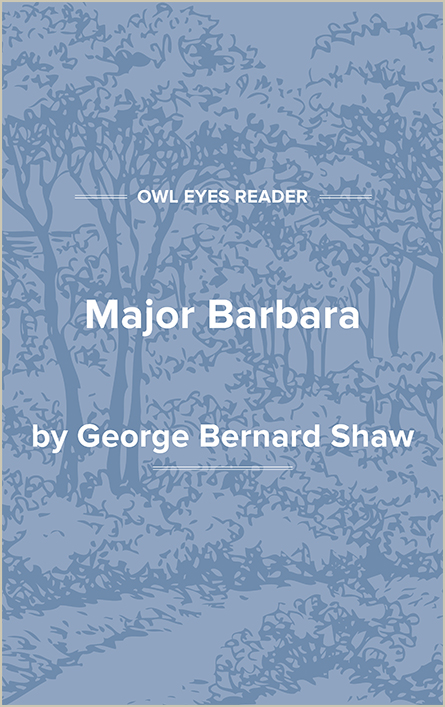Study Guide
Summary
Major Barbara is a literary use of myths and their cultural references. Its conception was facilitated by the two-volume 1890 publication of Sir James George Frazer’s The Golden Bough and its treatment of the Christian Gospel story as only one myth among others. Shaw based Major Barbara on several Christian legends; the myth of Barbara, the patron saint of gunners and miners, is linked with a version of Christ’s mission, betrayal, passion, and ascension. These Christian elements are combined with the myth of Faust, who sells his soul to the Devil in exchange for knowledge and power. The combination and alteration of these myths as well as numerous discussions on ethics and religion make Major Barbara one of Shaw’s most ambiguous plays, one that continues to provoke rival interpretations.
In a kind of drawing-room comedy, the play’s first act introduces the Undershaft family: the bourgeois Lady Britomart, a caricature of the grande dame; her husband, the weapons producer Andrew Undershaft, from whom she has been separated for decades; their daughters Barbara and Sarah and their fiancés; and the slow-minded, pampered son Stephen. Lady Britomart invites her husband to her house in order to ask him for more money to support their children and to make him reconsider his decision that in keeping with tradition his weapons enterprise can be inherited only by a foundling. Their daughter Barbara, a Salvation Army major, invites Undershaft to see her shelter. He agrees to do so if she will visit his weapons factory.
The play’s second act is set in Barbara’s Salvation Army shelter, a Dickensian illustration of poverty. While looking for his girlfriend, the strong, unruly Bill Walker slaps two women. He feels remorse for his deed and offers one pound to be forgiven, but Major Barbara does not accept his money. She wants to convert his soul instead. As she is about to convert him to the Salvation Army and to Christian behavior, her superior accepts five thousand pounds each from a whiskey distiller and from Undershaft. These donors embody alcoholism and violence, evils that Barbara has been fighting. She resigns over this undermining of principles. Simultaneously, a man who had apparently been converted to the Salvation Army only hours earlier steals Bill’s pound. Barbara loses her grip on Bill’s soul and must realize that she has failed in her work as a missionary.
Shaw stressed in his preface that in Andrew Undershaft he has created a man who understands that “the worst of our crimes is poverty” and that humanity’s foremost endeavor must be to avoid poverty. Upon seeing the poor in his daughter’s soup kitchen, Undershaft says that,Poverty blights whole cities; spreads horrible pestilences; strikes dead the very souls of all who come within sight, sound or smell of it. . . . [The millions of poor people] poison us morally and physically: they kill the...
(The entire page is 734 words.)
Owl Eyes subscribers get unlimited access to our expert annotations, analyses, and study guides on your favorite texts. Master the classics for less than $5/month!

